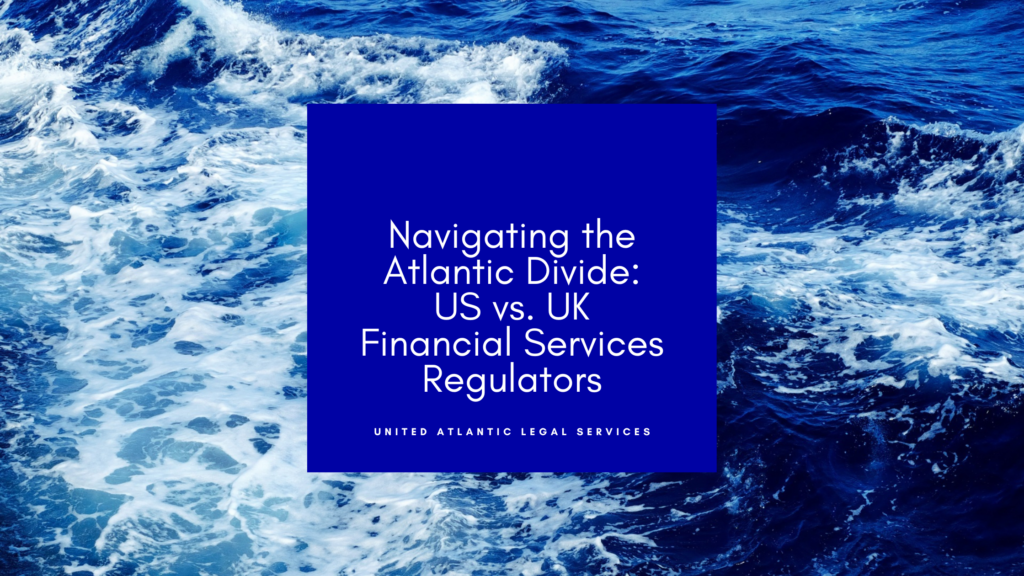
Hello and welcome back to United Atlantic Legal Services’ blog post. In this week’s article we discuss the differences between financial services regulators in the United States (US) and the United Kingdom (UK). Thank you for joining us! You can watch our Founder, Michael Rasmussen, discuss this topic on our YouTube channel by clicking the video below.
The financial services industry is a global powerhouse, serving as the backbone of modern economies. To ensure the stability, integrity, and fairness of this sector, countries establish regulatory bodies that oversee its operations. The US and the UK, two economic giants on either side of the Atlantic, have developed distinct regulatory frameworks for their financial services industries. In this blog, we’ll delve into the key differences between the financial services regulators in the US and the UK, shedding light on how these differences impact businesses, consumers, and the broader economy.
Regulatory Structure and Frameworks
The regulatory landscape in the US and the UK reflects their unique legal and political systems. In the US, the financial services industry is overseen by multiple regulatory agencies, including the Securities and Exchange Commission (SEC), the Commodity Futures Trading Commission (CFTC), and the Federal Reserve. These agencies have overlapping jurisdictions, resulting in a more fragmented regulatory environment. In contrast, the UK employs a more centralized approach with the Financial Conduct Authority (FCA) as the primary regulatory body, overseeing both prudential and conduct regulations.
Prudential vs. Conduct Regulation
Prudential regulation focuses on the financial health and stability of institutions, while conduct regulation ensures fair treatment of consumers and market integrity. In the UK, the Prudential Regulation Authority (PRA) is responsible for prudential regulation, ensuring the safety and soundness of financial institutions. The FCA, on the other hand, handles conduct regulation, aiming to protect consumers and maintain market integrity. In the US, these responsibilities are divided among multiple agencies, often leading to challenges in coordination and communication between regulators.
Enforcement and Approach
Enforcement strategies vary between the two countries. US regulators are often known for their enforcement actions and penalties, which can be significant. UK regulators, particularly the FCA, tend to emphasize a principles-based approach, focusing on collaboration and encouraging businesses to self-regulate within a set of overarching principles. This approach aims to foster a culture of compliance and responsible behavior.
Licensing and Market Entry
The process of entering the financial services market differs significantly between the US and the UK. The US has a state and federal dual regulatory system, which means financial institutions may need to adhere to both state and federal regulations, leading to complexity and potential duplication. In the UK, the “passporting” system, which previously allowed financial firms authorized in one EU/EEA country to operate in any other, changed due to Brexit. Now, UK firms require regulatory equivalence recognition to access EU markets.
Fintech and Innovation
Both the US and the UK have recognized the importance of fostering innovation in the financial services sector. The UK has been proactive in creating regulatory sandboxes, allowing fintech startups to test their products in a controlled environment. The FCA has also established a regulatory framework for crypto-assets. In the US, regulatory clarity around emerging technologies like cryptocurrencies and blockchain has been evolving, with various agencies providing guidance, but the lack of a single unified approach can create uncertainty.
Conclusion
The differences between US and UK financial services regulators stem from their historical, legal, and political contexts. While the US boasts a more fragmented regulatory landscape with a focus on enforcement, the UK employs a centralized approach that emphasizes collaboration and principles-based regulation. These differences impact market entry, innovation, and consumer protection. As the financial services sector continues to evolve in the face of technological advancements and global challenges, understanding these regulatory distinctions becomes crucial for businesses, investors, and consumers on both sides of the Atlantic.
About the Author

Michael Rasmussen is the founder of United Atlantic Legal Services. He is a licensed attorney in Florida and registered solicitor in the United Kingdom. Michael has acted as General Counsel and Chief Compliance Officer to several investment advisers, including private fund managers, responsible for the management of billions of dollars in client assets.
Michael is also the founder of FinProLaw, an online learning platform where Michael has created courses designed for investment adviser compliance professionals. These courses include:
- Investment Adviser Compliance Essential for Chief Compliance Officers
- Foundations of Investment Adviser Compliance
- What is a “Security”?
- Investment Adviser Marketing Rule
- Regulation A – Exemption from Registration
- Regulation Crowdfunding – Exemption from Registration
- Regulation D – Exemption from Registration
Michael can also be found on LinkedIn.
Investment adviser firms who are also clients of United Atlantic Legal Services can receive many of these courses at a significantly reduced fee or, in some cases, at no expense. Contact us today or visit the FinProLaw to learn more.